New Delhi fails to uphold human rights standards in Kashmir, India: Amnesty
 New York: Amnesty International in its report issued, this week, has vehemently criticized New Delhi for its human rights record in occupied Jammu and Kashmir and across India.
New York: Amnesty International in its report issued, this week, has vehemently criticized New Delhi for its human rights record in occupied Jammu and Kashmir and across India.
According to Kashmir Media Service, the Amnesty International report titled “Why should India’s human rights record matter in its bid for a permanent seat on the UN Security Council?”, said, “The situation in [occupied] Jammu and Kashmir remains particularly concerning, with reports from the Office of the High Commissioner for Human Rights (OHCHR) urging India to honor its international obligations. Rather than engage with these findings, Indian authorities have dismissed them as false narratives.”
“India has also been the subject of two reports, in 2018 and 2019, from the OHCHR on the situation of human rights in Kashmir. Both reports called on the Indian authorities to respect international human rights obligations in the region, repeal or amend repressive laws such as the Armed Forces (Jammu and Kashmir) Special Powers Act and the Jammu & Kashmir Public Safety Act, end restrictions on journalists and investigate all blanket bans or restrictions.”
“However, instead of meaningfully engaging with the OHCHR, the Indian authorities called the reports ‘false, with a motivated narrative’ and accused the human rights body of ‘legitimising terrorism’. On 5 August 2019, the Indian government unilaterally repealed the critical provisions of Article 370 of the Indian Constitution – which had guaranteed far-reaching powers to the state of Jammu & Kashmir on a wide range of issues except foreign affairs, defence and communication – and extended its control over the region. Jammu & Kashmir’s was then deprived of its statehood and split it into two separate union territories governed by the central government. The move was seen as a brutal dismissal of decades of protests against the human rights violations committed by the state and security forces in Jammu & Kashmir and an aggressive gesture to deprive the state’s inhabitants of their fundamental freedoms.”
“India’s track record raises questions about its commitment to human rights, particularly in light of the ongoing crackdown on civil liberties and reprisals against those cooperating with the UN. The UN Secretary-General’s reports indicate that intimidation tactics have deterred civil society from engaging with the UN,” the report added.
As per the report, India’s engagement with various UN bodies, particularly the UN Human Rights Council (UNHRC), reveals a troubling pattern. Critics argue that India has not demonstrated strong leadership within the UNHRC or engaged constructively with its mechanisms.
Since 2019, India has faced approximately 25 statements from UN human rights experts expressing concerns over its human rights practices.
The UNSC, comprising five permanent and ten non-permanent members, is tasked with maintaining international peace and security. As India seeks a permanent seat, its past as a non-permanent member—serving eight times, with its most recent term from 2021 to 2022—comes under scrutiny.
UN High Commissioner for Human Rights Michelle Bachelet previously noted that promoting human rights is crucial for the UNSC to fulfill its mandate. As such, India’s human rights engagement becomes a focal point in assessing its candidacy.
India has participated in the Universal Periodic Review (UPR), a mechanism examining each state’s human rights record. However, it has made little progress on recommendations, particularly regarding the rights of religious minorities and the ratification of the UN Convention against Torture, which it signed in 1997 but has yet to ratify.
The report also criticized Indian government for its inadequate responses to communications from UN Special Procedures, having addressed less than a third of over 200 inquiries since 2011. Furthermore, the country has only facilitated two visits by UN experts since the ruling Bharatiya Janata Party came to power in 2014, leaving 19 requests pending.
India’s participation in human rights treaties is limited, ratifying only six of nine core treaties. Its recent review by the Human Rights Committee highlighted persistent issues, including discrimination, violence against women, and inadequate protections for marginalized communities.
For India to be a credible candidate for a permanent UNSC seat, it must demonstrate a genuine commitment to human rights standards and engage responsibly with UN human rights entities. The path to reforming the UNSC should not overlook the performance and accountability of candidate nations in human rights matters, the Amnesty report maintained.








